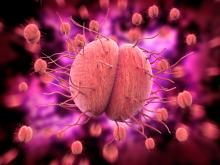STD: Gonorrhea
Gonorrhea is a sexually transmitted disease (STD) caused by a bacterium called Neisseria gonorrhoeae. It is the second most commonly reported STD in the state.
Health care professionals should go to the Health Care Professionals webpage for information on reporting STDs and other items.
Am I at risk for gonorrhea?
If you are having sex, you can get gonorrhea. You are at greater risk if you are a:
- Teenager having sex
- Person with any STD
- Person with a sex partner who has an STD
- Person with more than one sex partner
- Person with a new sex partner
- Person using a social app to find new sex partners
How can I avoid getting gonorrhea?
There are many ways to prevent getting gonorrhea. Practice safer sex:
- Use condoms or dental dams every time you have sex. These barriers protect you and your partner from sexual fluids and some skin-to-skin contact, which can both spread STDs.
- Get tested for STIs regularly. Most people with STDs don’t have symptoms or know they’re infected, and they can easily pass the infection to their partners. So testing is the only way to know for sure whether or not someone has an STD.
- Have honest conversations around sexual history with your partner(s). Talk about past partners, history of STIs, and drug use before beginning sexual relations with a new partner. This can help you know about your risk and ways to prevent STIs.
- Check your body frequently and be aware of your partner's body. Look for signs of a sore, blister, rash, or discharge.
- Wash shared sex toys with soap and water before they touch another person’s body. You can also use condoms on sex toys—change the condom before it touches another person’s body.
Fact sheets
Learn more about the causes, risk factors, and treatment of gonorrhea:
- Department of Health Services fact sheet, P-42048, in multiple languages
- CDC (Centers for Disease Control and Prevention) fact sheet (in Spanish)
Testing and treatment
Find locations around the state where you can get tested. Many of these locations allow you to get expedited partner therapy (EPT) for your partner.

